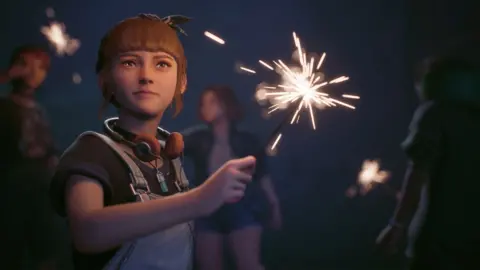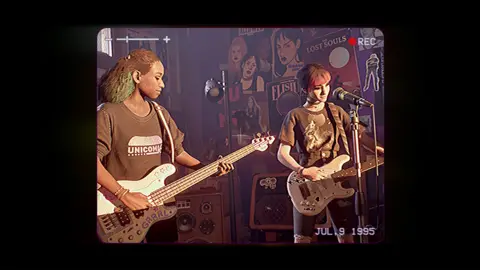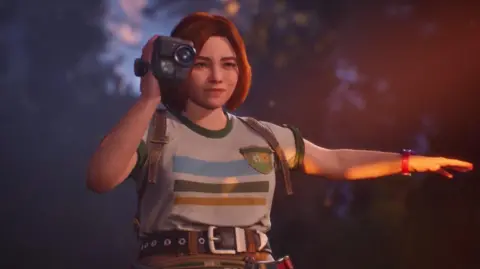Lost Records: 'It's OK to make games for different audiences'
 Don't Nod
Don't Nod"What's in the box?"
That's the question fans of Lost Records: Bloom & Rage have been asking since February, when the first part of the narrative adventure game dropped.
The story follows a group of female friends, hopping between their lives as teenagers in the 1990s and as adults in the present.
They are reunited by a mysterious package that threatens to expose a dark secret they've suppressed for 27 years.
Part one, Bloom, was praised by fans for its characters and LGBT representation, even if it left them with an almighty cliffhanger to ponder.
BBC Newsbeat caught up with creative director Michel Koch, executive producer Luc Baghadoust and lead actress Olivia Lepore to discuss the reaction to it, and what to expect from part two - Rage.
Lost Records is made by Don't Nod, the original developers of The Life is Strange series, first released in 2015.
The episodic adventure's narrative unfolded depending on player choices, and was praised for its emotional depth.
It was also unafraid to tackle difficult subjects rarely seen in video games at the time.
Lost Records is seen as a spiritual successor and uses a similar, episodic structure, split across two "tapes".
While the first was well-received by critics, a common criticism was its slow pacing, with a heavy focus on characters and relationships over big story moments.
Michel admits that was "definitely a gamble".
But he says the team wanted to recreate the feeling of a never-ending teenage summer, focusing on "those moments of enjoying doing nothing in a world where we are always pressurised to do something".
"Just sometimes having the opportunity to enter a world where you can be peaceful and enjoy the mood, I think it's important," he says.
 Don't Nod
Don't NodLost Records features an all-female cast, LGBT themes and touches on social issues such as body image.
That made it a target for what Luc and Michel call a "vocal minority" online who target releases they consider to be "woke".
"We are in a weird time for that right now," says Michel.
"We are making games for people who want those kind of games.
"I think video games need to start to be more mature about that.
"It's OK that there are a lot of different games and different genres and different audiences.
"It doesn't mean that because something exists, it's a threat to the other things you like."
Exec producer Luc admits the game is not for everyone but has so far had a "great reaction" from fans who've clicked with it.
"We made a game we would want to play," he says.
"It's a way to really express what you wanted to and reach a different audience."
'Expect the unexpected'
Lost Records has generated discussion around its portrayal of issues many teenagers deal with.
When the game was first revealed there was a focus on the fact characters had visible acne scars - an unusual feature for a video game - and references throughout to Swann's struggles with her weight.
Michel says the creators didn't want to make issues like this a main theme of the game.
"But it's still present, because in the '90s, there was still, of course, the peer pressure from the parents to, I don't know, just start a diet," he says.
The main focus of tape one, Michel says, was having the characters find a group of close friends who would accept them for who they were.
"That's where you can start to accept yourself even more," he says.
"Because they are the reflection of who you are and if they like you, it means that you are likeable and you can love yourself."
 Don't Nod
Don't NodOlivia Lepore, who plays main character Swann Holloway, tells Newsbeat a lot of the game's themes - and her character's story - resonated with her.
"I think part of the reason I got this role is because we have so much in common," she says.
"And I didn't feel like I had to put on a character playing her. I definitely just, in many ways, got to be myself."
Olivia says that she's been blown away by the response from fans, who've identified with many of the themes and issues raised in the game.
"I have gotten some really beautiful messages from fans about how they feel like they connect with Swann," she says.
"I've been really touched by some of the messages to the point where it could be a bit overwhelming, because I just empathise so much with everybody's story."
As for the conclusion of the story, Olivia says "expect the unexpected".
"Wherever you think it's going. It's probably not," she says.
Michel says choices players made in part one will play out in the second, which is set to go to some darker places - and be much more dramatic.
"You can expect things to be, let's say, less happy and sunny and more gloomy than tape one.
"And we can't wait for you to open the box."

